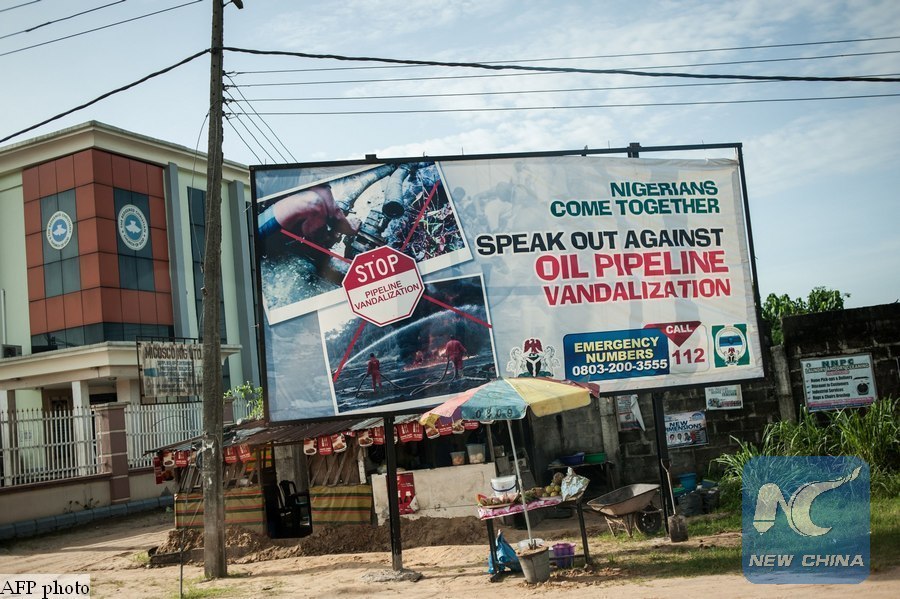
A file picture taken on June 8, 2016 shows an advertising board in the City of Warri in the Delta State. The Niger Delta Avengers, a militant group that has been attacking Nigeria's oil infrastructure since early this year, is anything but new, according to those familiar with the region. Despite their fresh name, it was only a matter of time before the militants returned to the swamps and creeks of the delta region, the sources said. (AFP/Stefan Heunis)
LAGOS, Aug. 23 (Xinhua) -- Militancy in the oil-rich Niger Delta region had destabilized Nigeria's oil industry, Minister of State for Petroleum Resources Ibe Kachikwu has said.
Speaking at the 2016 Annual Conference of National Association of Energy Correspondents in Lagos last week, the minister said Nigeria has recorded 1,600 cases of pipeline vandalism since January, noting that the country recorded over 3,000 pipeline vandalism cases from 2010 to 2015.
The impact of attacks on oil and gas pipelines was that there was no money to fund the 2016 budget, he added.
Over the last few months, members of the Niger Delta Avengers (NDA) have bombed numerous oil facilities belonging to international oil companies in the Niger Delta region.
The militant group has demanded more crude oil revenues for the oil-producing states, the release of militants who are being detained or incarcerated, and continued funding of the amnesty program for former militants.
The group's bomb attacks on oil facilities have forced oil firms in the Delta region to be on high alert, to take significant security measures to protect their employees, and cut down on oil production.
The unrest in the region has forced many international firms to flee the area. The government mobilized the Nigerian army and coast guard in an anti-banditry operation
The minister also said that declining price of oil in the international market had negatively impacted the country's revenue leading to economic recession.
He said proactive steps were required to bring Nigeria's economy back on positive track.
According to him, while vandals wreak havoc on oil facilities and cripple local production, over-supply of product in the market is also affecting prices and creating shocks to the economy.
Kachikwu said time had come for the country to face the reality as there was no assurance that the price of oil would peak as being speculated.
He hinged his argument on the fact that OPEC merely controlled 30 percent of the market while 70 percent was in the hands of major producers, such the U.S., Russia and Mexico, which were not OPEC members.
He said the industry was challenged by six billion U.S. dollars cash call indebtedness accumulated over the last five years.
The minister said with inadequate financing of the industry, no investment had occurred in the sector in the last five years.
He said 643 million liters of petroleum products was lost in 2015, while between January and June a loss of 109 million liters of petroleum products and 560,000 barrels of crude had been recorded.
Kachikwu said about 850 million standard cubic feet of gas production had been lost from crises.
He said the government was stepping up efforts to make robust policies that would finalize and gazette a comprehensive gas policy, unlock gas potential and ensure effective development of Nigeria's gas market.
He said the policy would help to transit from gas flare penalty regime to gas commercialization and shift focus from government-built to investor-built infrastructure.

